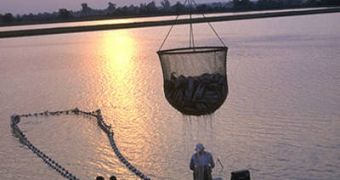On account of the fact that fish stocks from all over the world are currently under threat because of overfishing, a group of experts has conducted a survey focused on analyzing the history of fishing in Europe. The conclusion of their investigation is troubling – the Old Continent has been harvesting more fish than sustainable for at least 1,000 years. Numerous data have been used to put this conclusion together, and the researchers say that the find is very troubling. Over the past decades, industrial fishing has accelerated an already devastating process.
Across the globe, key tuna populations are in danger of collapsing, and that's only one of the most commonly known types of fish. In reality, hundreds of species are in danger of not being able to sustain fishing at the rate it's done now, by factory ships and tens of kilometers of nets spread across the oceans.
Historical records show that, in the Gulf of Mexico, tens of thousands of tonnes of cod existed in the past, while now only a few, small populations remain. In the 19th century, the coast of New Zealand was teeming with whales, which are now all but gone from the area, ABC Science reports.
“We see similar patterns of human impacts on the oceans pretty much everywhere, and in many cases real depletion,” University of New Hampshire expert Dr. Andy Rosenberg warned. He has been the leader of a project called the History of Marine Animal Population (HMAP), which is part of the larger 10-year Census of Marine Life due for completion in 2010. The conclusions will be presented this week at the Oceans Past conference, to be held in Vancouver, Canada.
The study, other than hinting at the cruelty of the human nature, also provides researchers with additional information about marine ecosystems, which they could then use to recreate better conservation programs for a large number of endangered species. “We need to have better biological information and HMAP is providing some of the solution,” the global chair of HMAP, Trinity College in Dublin Professor Poul Holm, concluded.

 14 DAY TRIAL //
14 DAY TRIAL //